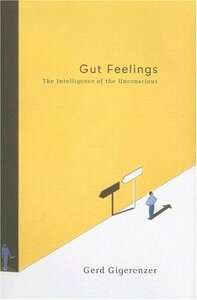Take a photo of a barcode or cover
There are a bunch of new "science of choice" books on the market, and I think Gut Feelings preceded and anticipated most of them. The book's central thesis is that sometimes when we're just guessing, we're relying on information we may not know we know (for instance, in someone with a basic knowledge of geography, having heard of a country usually indicates it is more populous). The writing was clear and diagrams helpful.
Gut Feelings is an excellent book: great empirically rooted ideas, well-written and accessible, brief but not lacking in clarity. It’s one of the best books I’ve read in decision-making and cognitive psychology. It also contains what are probably among the most confronting ideas I’ve faced this year. For someone like myself who is—consciously or not—operating in the more-[information]-is-always-better paradigm, Gigerenzer’s line of work can be quite disturbing.
The various heuristics—or so-called “rules of thumb”—used to predict the future (e.g., where a ball will land, which tennis player is likely to win, or even whether a patient is having a heart attack) that Gigerenzer and his colleagues studied testify to how our brain elegantly navigates information and finds shortcuts to decisions. Maybe more importantly, they force us to reconsider the reliability of intuition; in some contexts, intuition is as reliable or even more reliable than complex decision architectures. Gut Feelings is about these contexts and their corresponding rules of thumb.
A fascinating read.
The various heuristics—or so-called “rules of thumb”—used to predict the future (e.g., where a ball will land, which tennis player is likely to win, or even whether a patient is having a heart attack) that Gigerenzer and his colleagues studied testify to how our brain elegantly navigates information and finds shortcuts to decisions. Maybe more importantly, they force us to reconsider the reliability of intuition; in some contexts, intuition is as reliable or even more reliable than complex decision architectures. Gut Feelings is about these contexts and their corresponding rules of thumb.
A fascinating read.
informative
lighthearted
fast-paced
informative
inspiring
slow-paced
This book would probably be a lot more interesting if the author didn't use the phrase "rules of thumb" so much. I assume he has no idea what kind of sexist term that is, being the old rule that you could beat your wife with a switch as long as it was smaller than your thumb...
I couldn't keep reading because I just saw women being beaten in my head every time I read the phrase.
I couldn't keep reading because I just saw women being beaten in my head every time I read the phrase.
A good review of why "gut feelings" can be better than rational processes, this book could've been more succinct as just as informative.
Flatly, this wasn't one of the best books on behavioral economics. There were far better ones trying to explain how irrationally our mind works, from those of Dan Ariely to Daniel Kahneman. But what this book was good for was about how intuition can help us make our decisions correctly most of the time.
The subject is a can of worms. With each school going at it from both ends. What Dr. Gigerenzer has managed to do is give us more than a decent share of examples and cases where intuition has worked better than logic or reasoning.
So, if you ever want to understand that feeling in the pit of your stomach, this book may be able to answer some questions that you might have.
The subject is a can of worms. With each school going at it from both ends. What Dr. Gigerenzer has managed to do is give us more than a decent share of examples and cases where intuition has worked better than logic or reasoning.
So, if you ever want to understand that feeling in the pit of your stomach, this book may be able to answer some questions that you might have.
This book written by a German scientist of human cognition is very readable. Gigerenzer gives research based explanations of how intuition really works.


